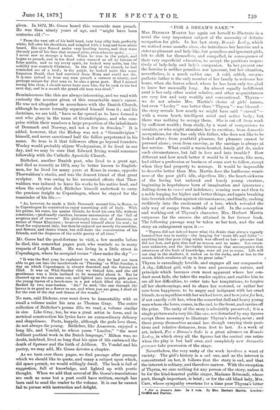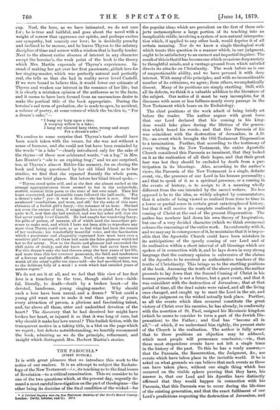"FOR A DREAM'S SAKE."* MRS. HERBERT MARTIN has again set
herself to illustrate in a novel the very important subject of the necessity of definite occupation for girls. In her last story, Bonnie Lesley, which we noticed some months since, she introduces her heroine and a sister as pleasant and lady-like, but penniless and ignorant girls,. left to shift for themselves, and compelled, in consequence of their very superficial education, to accept the positions respec- tively of lady-help and lady's companion. In her present one the heroine is neither penniless nor ignorant, but her situation, nevertheless, is a much sadder one. A cold, selfish, unsym- pathetic father is the only member of her family to welcome her home, when she leaves school, where he has been only too glad to leave her unusually long. An almost equally indifferent aunt is her only other senior relative, and other acquaintances are very few and very worldly and conventional. Thyrza- we do not admire Mrs. Martin's choice of girls' names,.
but even " Lesley " was better than "Thyrza "—was blessed— the story reveals how nearly we might have said "cursed "- with a warm heart, intelligent mind and active body; but there was nothing to occupy them. She is cut off from work by sufficient wealth ; from study, by a want of companions to.
emulate, or who might stimulate her to exertion ; from domestic occupations, for she has only this father, who does not like to be looked after ; from youthful pleasure, for pleasure cannot be pursued alone ; even from exercise, as the carriage is always at her service. What could a warm-hearted, lonely girl do, under such circumstances, but fall in love and into trouble ? How different and how much better it would be if women, like men,. had either a profession or business of some sort to follow, except when they had property to manage. It would be impossible to describe better than Mrs. Martin does the loathsome weari- ness of the poor girl's idle, objectless life; the heart-sickness of the loving but unloved and lonely young creature,.
beginning in hopefulness born of imagination and ignorance ; dulling down to ennui and indolence ; rousing now and then t> a noble longing for higher and better things, and again breaking into feverish rebellion against circumstances; and finally, rushing recklessly into the excitement of a love, which revealed the only way of escape from solitude and self. In the conception and, working-out of Thyrza's character, Mrs. Herbert Martin surpasses far the success she attained in her former book.. The following passage may be taken as her text, and the sad. story an enlargement upon it :—
"Thyrza did not indeed know what the desire that always vaguely haunted her was in reality—the longing for more life and fuller '- anything but this poor thing which was offered to her—pleasure that did not last, and pain that had no reason and no name. But sweet- ness unknown, and the inevitable bitterness that accompanies that sweetness of the fruit of knowledge, were all yet to come. Life will not stay in the shallows it rushes on to the rocks, and at last to the
ocean, which swallows all up in its great calm." •
Thyrza is exceedingly lovable, and engages all our compassion A shy, diffident girl, with a true and passionate nature, and principle which becomes even most apparent where her con- duct most fails, she takes the reader captive, and enables him to see all her difficulties, to enter into her temptations, to forgive all her shortcomings, and to share her restored, or rather her new-born happiness, to be angry and indignant with her cruel friends, to sympathise with her wicked lover, and to rejoice for her, if not exactly with her, when the somewhat dull and heavy young man whom she loves, comes, in the end, to the front, and carries off the prize. The unity of the story is admirably preserved ; it is a single picture and a very life-like one, not disturbed by any figures except those necessary to illustrate Thyrza's development ; and these group themselves around her, though varying their posi- tions and relative distances, from first to last. As a work of art, indeed, For a Dream's Sake is a great advance on Bonnie Lesley, in which story all the figures but the central one retire when the play is but half over, and completely new dramati& persona take possession of the stage.
Nevertheless, the very unity of the work involves a want of variety. The girl's history is a, sad one, and as the interest is concentrated on her, it follows that the story is sad, and that the interest is solitary, and therefore narrow. With the exception of Thyrza, we care nothing for any person of the story, unless it be for the kind-hearted public singer, Madame Remondi, whose part, though important, is brief ; or for the old blind lady, Mrs. Carr, whose sympathy sweetens for a time poor Thyrza's bitter
• For a Dream's Dab. In 2 vols. By Mrs. Harbert Martin. London: Griffith and Farran.
cup. Noel, the hero, as we have intimated, we do not care for ; he is true and faithful, and goes about the novel with a weight of sorrow that oppresses our spirits, and perhaps excites our sympathy, but scarcely our love; he is decidedly preachy and inclined to be morose, and he leaves Thyrza to the salutary discipline of time and sorrow with a wisdom that is hardly tender. Next to the almost entire absence of interest in any character except the heroine's, the weak point of the book is the theory which Mrs. Martin expounds of Thyrza's experiences. In- stead of making her get over her first passionate, girlish love for her singing-master, which was perfectly natural and perfectly real, she tells us that she had in reality never loved eastern. If we were bound to believe this, it would lower our estimate of Thyrza and weaken our interest in the romance of her life; but it is clearly a mistaken opinion of the authoress as to the facts, and it seems to have been formed from an unconscious desire to make the poetical title of the book appropriate. During the heroine's sad term of probation, she is made to open, by accident, a volume of poetry, at some verses of which the burden is, "For a dream's sake,"—
" I hang my harp upon a tree, A weeping willow in a lake;
I hang my silenced harp there, wrung and snapt For a dream's sake."
We confess to some surprise that Thyrza's taste should have been much taken with the verses, for she was not without a sense of humour, and she could not but have been reminded by the words "in a lake "—clearly introduced only for the sake of the rhyme—of those now celebrated words, "on a log," in Mrs. Leo Hunter's "ode to an expiring frog ;" and we are surprised, too, at Thyrza's almost Bidder-like memory, for on closing the book and being questioned by her old blind friend as to her studies, we find that she repeated fluently the whole poem, after that one brief glance. But before her blind friend spoke,—
" Thyrza stood quite still, and at the first she almost smiled at the strange appropriateness there seemed to her in the melancholy, morbid, musical little poem to the state of her own mind. Then her heart contracted, and irresistible tears followed the half-smile. `For a dream's sake !' yes—it was a dream—she knew it now. She had awakened comfortless, and worn, and old,' for the sake of this mere chimmra of a foolish girl's fancy,—the romance of an hour. She had not even the excuse of true, if misguided, love to plead, for she knew quite well, now that she had awaked, and was her sober self, that she had never really loved Castelli. He had caught her wandering fancy; his gifts of person, of manner, all of which need the immediate pre- sence to make real, and which I have not been able to reproduce any more than Thyrza could now, so as to feel what had been the reason of her madness; his wonderfully beautiful voice, and the fascination which a passionate and eloquently expressed love must have over a sensitive girl's nature, all these had made the false glamour which led her so far astray. Now to the dazzle and glamour had succeeded the chill mists of reality, and she knew that this had never been love. For this dream's sake she had thrown away the best years of her life, and more than this her sweetest possession, the faith and tenderness of a fervent and unselfish affection. Noel, whose manly nature was worth all the other's gifts ten times told—she had sacrificed him, too, to the delirious folly of a week ! a week which had entailed years of useless regret."
We do not see it at all, and we feel that this view of her first love is a treachery to the true, though sinful love —faith- f al, literally, to death—death by a broken heart—of the devoted, handsome, young singing-master. Why should such a love have been unreal, and a dream ? What could a young girl want more to make it real than parity of years, every attraction of person, a glorious and fascinating talent, and, far above all these, utter and undoubted devotion of the heart? The discovery that he had deceived her might have broken her heart, or injured it so that it was long of cure, but why should it make her love unreal? This foolish fiction, with its transparent motive in a taking title, is a blot on the page which we regret ; but defects notwithstanding, we heartily recommend the book, admiring as we do the principle, refinement, and insight which distinguish Mrs. Herbert Martin's stories.



































 Previous page
Previous page